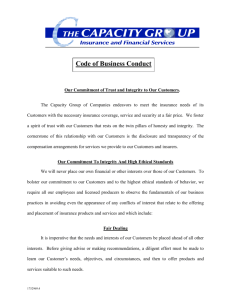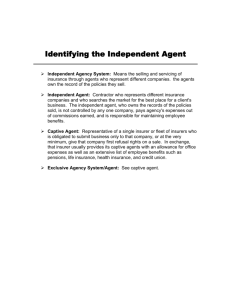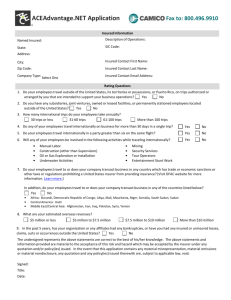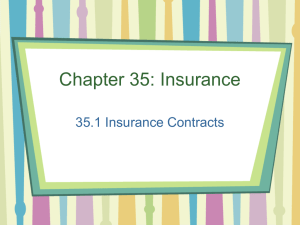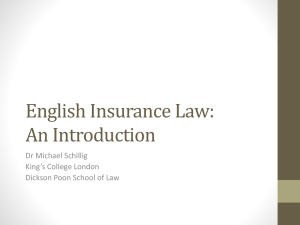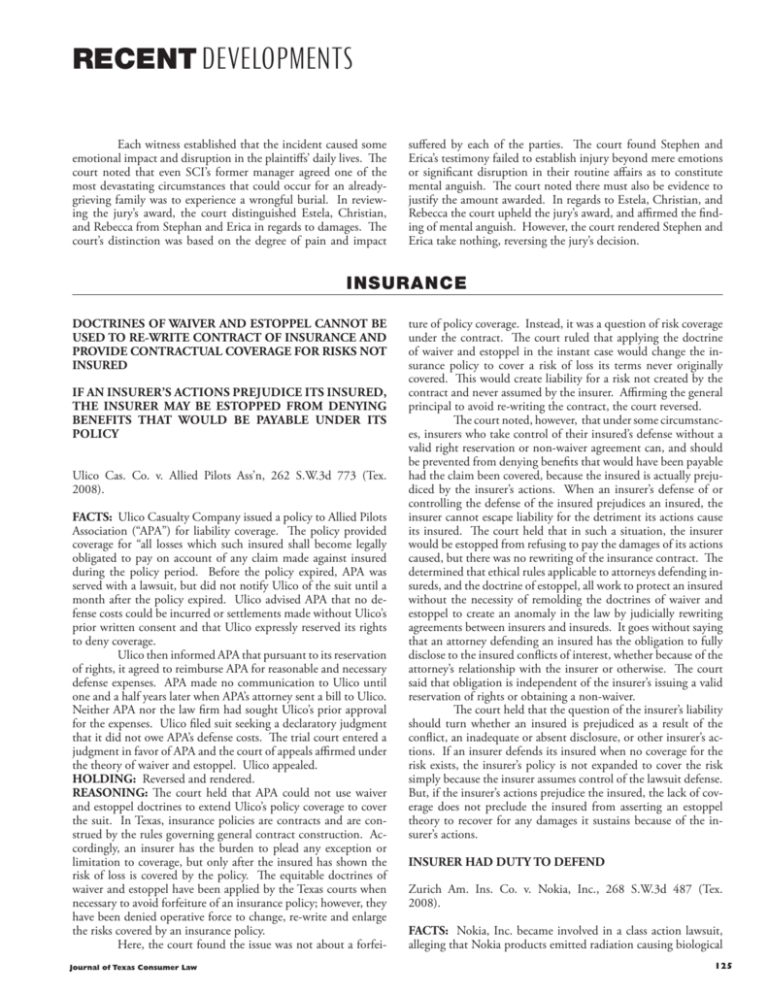
RECENT DEVELOPMENTS
Each witness established that the incident caused some
emotional impact and disruption in the plaintiffs’ daily lives. The
court noted that even SCI’s former manager agreed one of the
most devastating circumstances that could occur for an alreadygrieving family was to experience a wrongful burial. In reviewing the jury’s award, the court distinguished Estela, Christian,
and Rebecca from Stephan and Erica in regards to damages. The
court’s distinction was based on the degree of pain and impact
suffered by each of the parties. The court found Stephen and
Erica’s testimony failed to establish injury beyond mere emotions
or significant disruption in their routine affairs as to constitute
mental anguish. The court noted there must also be evidence to
justify the amount awarded. In regards to Estela, Christian, and
Rebecca the court upheld the jury’s award, and affirmed the finding of mental anguish. However, the court rendered Stephen and
Erica take nothing, reversing the jury’s decision.
INSURANCE
DOCTRINES OF WAIVER AND ESTOPPEL CANNOT BE
USED TO RE-WRITE CONTRACT OF INSURANCE AND
PROVIDE CONTRACTUAL COVERAGE FOR RISKS NOT
INSURED
If an insurer’s actions prejudice its insured,
the insurer may be estopped from denying
benefits that would be payable UNDER ITS
POLICY
Ulico Cas. Co. v. Allied Pilots Ass’n, 262 S.W.3d 773 (Tex.
2008).
FACTS: Ulico Casualty Company issued a policy to Allied Pilots
Association (“APA”) for liability coverage. The policy provided
coverage for “all losses which such insured shall become legally
obligated to pay on account of any claim made against insured
during the policy period. Before the policy expired, APA was
served with a lawsuit, but did not notify Ulico of the suit until a
month after the policy expired. Ulico advised APA that no defense costs could be incurred or settlements made without Ulico’s
prior written consent and that Ulico expressly reserved its rights
to deny coverage.
Ulico then informed APA that pursuant to its reservation
of rights, it agreed to reimburse APA for reasonable and necessary
defense expenses. APA made no communication to Ulico until
one and a half years later when APA’s attorney sent a bill to Ulico.
Neither APA nor the law firm had sought Ulico’s prior approval
for the expenses. Ulico filed suit seeking a declaratory judgment
that it did not owe APA’s defense costs. The trial court entered a
judgment in favor of APA and the court of appeals affirmed under
the theory of waiver and estoppel. Ulico appealed.
HOLDING: Reversed and rendered.
REASONING: The court held that APA could not use waiver
and estoppel doctrines to extend Ulico’s policy coverage to cover
the suit. In Texas, insurance policies are contracts and are construed by the rules governing general contract construction. Accordingly, an insurer has the burden to plead any exception or
limitation to coverage, but only after the insured has shown the
risk of loss is covered by the policy. The equitable doctrines of
waiver and estoppel have been applied by the Texas courts when
necessary to avoid forfeiture of an insurance policy; however, they
have been denied operative force to change, re-write and enlarge
the risks covered by an insurance policy.
Here, the court found the issue was not about a forfeiJournal of Texas Consumer Law
ture of policy coverage. Instead, it was a question of risk coverage
under the contract. The court ruled that applying the doctrine
of waiver and estoppel in the instant case would change the insurance policy to cover a risk of loss its terms never originally
covered. This would create liability for a risk not created by the
contract and never assumed by the insurer. Affirming the general
principal to avoid re-writing the contract, the court reversed.
The court noted, however, that under some circumstances, insurers who take control of their insured’s defense without a
valid right reservation or non-waiver agreement can, and should
be prevented from denying benefits that would have been payable
had the claim been covered, because the insured is actually prejudiced by the insurer’s actions. When an insurer’s defense of or
controlling the defense of the insured prejudices an insured, the
insurer cannot escape liability for the detriment its actions cause
its insured. The court held that in such a situation, the insurer
would be estopped from refusing to pay the damages of its actions
caused, but there was no rewriting of the insurance contract. The
determined that ethical rules applicable to attorneys defending insureds, and the doctrine of estoppel, all work to protect an insured
without the necessity of remolding the doctrines of waiver and
estoppel to create an anomaly in the law by judicially rewriting
agreements between insurers and insureds. It goes without saying
that an attorney defending an insured has the obligation to fully
disclose to the insured conflicts of interest, whether because of the
attorney’s relationship with the insurer or otherwise. The court
said that obligation is independent of the insurer’s issuing a valid
reservation of rights or obtaining a non-waiver.
The court held that the question of the insurer’s liability
should turn whether an insured is prejudiced as a result of the
conflict, an inadequate or absent disclosure, or other insurer’s actions. If an insurer defends its insured when no coverage for the
risk exists, the insurer’s policy is not expanded to cover the risk
simply because the insurer assumes control of the lawsuit defense.
But, if the insurer’s actions prejudice the insured, the lack of coverage does not preclude the insured from asserting an estoppel
theory to recover for any damages it sustains because of the insurer’s actions.
INSURER HAD DUTY TO DEFEND
Zurich Am. Ins. Co. v. Nokia, Inc., 268 S.W.3d 487 (Tex.
2008).
FACTS: Nokia, Inc. became involved in a class action lawsuit,
alleging that Nokia products emitted radiation causing biological
125
RECENT DEVELOPMENTS
injury. Nokia had purchased a general commercial insurance policy from Zurich American Insurance Company. In Nokia’s policy,
Zurich agreed to defend Nokia against suit, but reserved the right
to contest the obligation to defend. As a result of the class action
suit against Nokia, Zurich sued Nokia, seeking a declaration that
Zurich had no duty to defend or indemnify.
The trial court granted Zurich’s motion for summary
judgment, declaring that Zurich had no duty to defend Nokia.
Nokia appealed, and the court of appeals reversed the trial court’s
ruling, noting that the suits at issue involved a claim of alleged
bodily injury and the business risk exclusion did not apply. On
appeal to the Texas Supreme Court, Zurich argued that they had
no duty to defend Nokia in the class action suit because the class
action did not state claims for bodily injury or seek damages because of bodily injury.
HOLDING: Affirmed as modified.
REASONING: In determining whether a duty to defend exists, the Texas Supreme Court follows the eight-corners rule,
also known as the complaint-allegation rule. An insurer’s duty
to defend is determined by the third-party plaintiff’s pleadings,
considered in light of the policy provisions, and without regard
to the truth or falsity of those allegations. All doubts regarding
the duty to defend are resolved in favor of the duty. Where the
complaint does not state facts sufficient to clearly bring the case
within coverage, the general rule is that the insurer is obligated to
defend if there is potentially a case under the complaint within.
The insurance policy stated that it covered bodily injury, whereas
all of the complaints couched the term as biological injuries. The
court was unable to state with certainty that the underlying claims
did not seek damages for bodily injury because the terms could
have the same meaning.
The court concluded that where a suit includes a potentially covered claim, the insurer must defend the entire suit, even
if the claim is groundless or fraudulent. Additionally, the court
concluded that where there are covered and non-covered claims
in the same lawsuit, the insurer is obligated to provide a defense
to the entire suit, at least until it can limit the suit to those claims
outside of the policy coverage. The court modified the court of
appeals’ judgment to provide a duty to defend ended upon filing
of the second amended complaint and, as modified, the court
affirmed.
DEBT COLLECTION
ATTEMPY TO COLLECT AMOUNTS DUE DID NOT VIOLATE AUTOMATIC STAY
Campbell v. Countrywide Home Loans, Inc., 545 F.3d 348 (5th
Cir. 2008).
FACTS: Caesar and Pamela Campbell obtained a loan from
Countrywide Home Loans for the purchase of a home. Campbells’ monthly mortgage payment contained two distinct elements. It included the monthly installment for principal and
interest, and it collected one twelfth of the estimated property
taxes and insurance due on the property at year’s end. Tax and insurance payments were deposited into an escrow account. Campbells filed a Chapter13 Bankruptcy. Countrywide filed a proof
of claim, listing delinquent pre-petition monthly principal and
interest payments, escrow expenses from prior years, and other
costs and fees. Countrywide did not include in its claim four
months of unpaid escrow payments, which accrued before the
bankruptcy.
In addition to its listed claims, Countrywide indicated, in its proof of claim, that it intended to increase Campbells’
monthly mortgage payment post-petition to recoup the four
months of escrow payments that were unpaid prior to the bankruptcy. Campbells objected to the increase in the mortgage payment, complaining that Countrywide’s actions were an impermissible attempt to recover a claim against them that arose before the
commencement of the bankruptcy case. The bankruptcy court
agreed, granting partial summary judgment and holding that
Countrywide’s actions constituted a willful violation of the automatic stay. Countrywide appealed challenging the finding that it
violated the automatic stay.
HOLDING: Reversed and rendered.
REASONING: The court held that a willful violation of an au126
tomatic stay means acting with knowledge of the stay. Whether
the party believes in good faith that it had a right to the property
is irrelevant to whether the act was willful or whether compensation must be awarded. Therefore, to establish an actionable violation of the automatic stay the Campbells must establish: (1) that
Countrywide knew
of the existence of the Filing for a proof of claim
stay; (2) that Countrywide’s
actions is the logical equivalent
were willful; and (3) of a request for relief
that Countrywide’s
actions violated the from the automatic stay,
automatic stay. It and could not in itself
is undisputed that
Countrywide knew constitute a violation of
of the existence of the stay.
the stay and that it
acted willfully and intentionally when it asserted the right to
an increased mortgage payment in its proof of claim. The only
issue in controversy was whether Countrywide’s actions violated the stay.
Certain categories of actions are statutorily identified as
prohibited by the automatic stay. None of these provisions bar a
creditor from filing a proof of claim pursuant to bankruptcy code
§501. The court found no precedents in which a court has held
that asserting a right to payment in a proof of claim constituted
a violation of the automatic stay. In fact, the court pointed to a
similar case where a bankruptcy court held that filing for a proof
of claim is the logical equivalent of a request for relief from the
automatic stay, and could not in itself constitute a violation of the
stay. The court viewed the analysis persuasive that the Bankruptcy Code allowed creditors to assert any claim even if that claim is
contingent, un-matured or disputed. In this case, Countrywide
Journal of Texas Consumer Law



